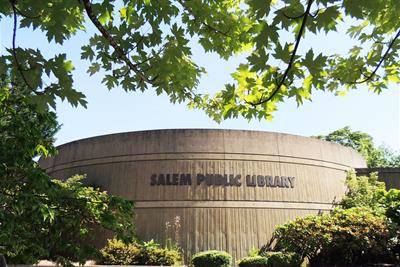Salem, Ore – In 2023, we have seen a distressing rise in budget cuts to libraries in Oregon, from Eugene Public Library and Linn-Benton Community College to Beaverton City Library and most recently Salem Public Library. These cuts have resulted in fewer hours, programs, and services and less equitable access for the public. Understandably, impacts on the library users are often the focus of communications and media about library cuts. Often overlooked, however, is the negative impact those cuts have on the morale and mental health of library staff.
Library work is already stressful, a fact evidenced by the recent audit of the Multnomah County Library (MCL). The audit found that nearly 75% of the MCL staff surveyed feel unsafe at work. As Oregon Public Broadcasting reporter Alex Zielinski observes, “By working in one of the few public spaces where visitors aren’t expected to spend money, library staff have become de facto first responders to the county’s dual behavioral health and housing crises.” This issue is not unique to Multnomah County, or any library in Oregon or indeed the nation. Libraries are institutions with staff who often work with people who are failed by other parts of society.
We as library workers know these people. They are the person experiencing houselessness whose only dry, warm place in the winter is the public library. They are the LGBTQ+ youth who seeks refuge in the school library. They are the first-generation college student who spends hours studying in the library because they weren’t properly prepared for higher education. Library workers very well may be the only individuals who consistently treat these people with compassion and listen to them.
This is to say, library work is important. It’s also exhausting, falling upon library workers whose training and education may ill prepare them for such emotional labor. And that labor is made even harder by a recent increase in attacks on libraries and library workers, whether that be the rise in intellectual freedom challenges – in which library staff have been intimidated and harassed, called groomers and pedophiles, or even received death threats – or attempts to undermine libraries’ financial underpinnings, as we’re seeing now in Josephine County.
Underfunding and cutting libraries magnifies this stress even more. At Linn-Benton Community College, budget cuts eliminated all faculty librarian positions, leaving the remaining staff unable to fully provide the range of services expected of an academic library. Staff at the Salem Public Library (SPL) have acutely felt underfunding and budget cuts as well. SPL has the lowest per capita funding of any large library in the state, with less than half the funding of its nearest peer, and less than a third of its best-funded peer. This has been the case for well over a decade.
That is why, while we are deeply saddened to see library budgets and hours cut, we applaud that SPL Acting-in-Capacity City Librarian Bridget Esqueda and her team considered the impact on staff when deciding what services the library could offer with a reduced budget.
Such cuts to Salem and other libraries are not sustainable for their communities, and they’re not sustainable for library staff. Libraries and library workers fulfill important needs, often to people whom society has left behind. Cutting library budgets to fund other municipal, academic, or school services doesn’t eliminate those needs. Instead, a heavier burden falls upon the already overburdened library staff who remain.
We hope that the communities served by libraries recognize and appreciate how challenging working in libraries can be for their staff. That is why the State Library provides resources and training to support library workers in addressing trauma and aftercare. But ultimately what we hope is that the people who make decisions about funding libraries recognize how those decisions impact library workers. Decisionmakers should seek out sustainable ways to fund their libraries for the sakes of their communities and the staff who serve them. We at the State Library stand ready to provide technical assistance to communities in those efforts.












